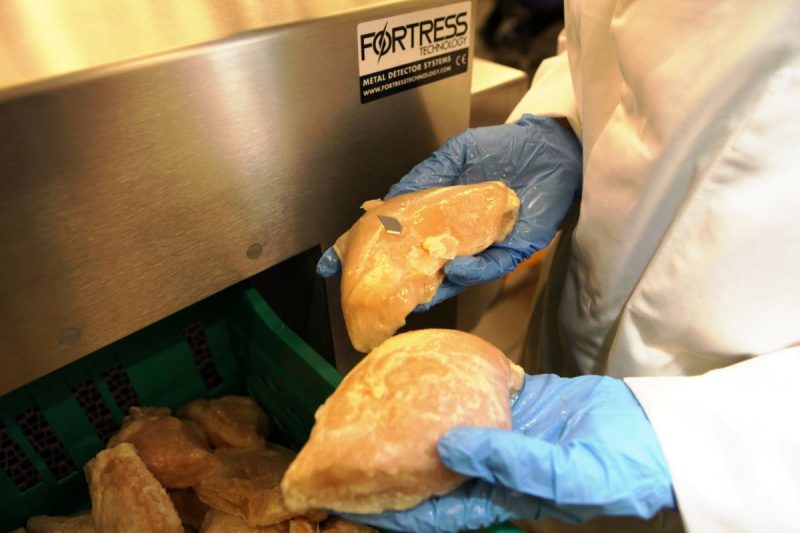If there’s one takeaway message from this year’s PPMA Total Show, it’s that there’s no room for lone wolves. Taking lessons learned from the pandemic, food safety custodian and contaminant inspection specialist Fortress Technology presented its framework of new support services for the digital transformation era. Illustrating how technology tools, real-time data capture, remote monitoring and machinery features engender a more joined-up and adaptive workforce culture. Empowering food safety at every level in food processing and packaging factories.
Collaborating with global GMP inspection & audit specialist AIB International, as well as hundreds of international food factories and drawing upon the expertise of QC professionals, Fortress created its modular cultural food safety roadmap. Targeting growth opportunities, production inefficiencies, QC reporting and audit transparency, the company’s ‘Food Safety Cultural Playbook’ focuses on eliminating workplace hierarchies to inspire an ethos where everyone is encouraged to be a hygiene-conscious, food safety champion. Where each individual every day ‘works like no-one is watching’.
Collaborating with the biggest names
Traditionally, food producers may have felt that sharing intellectual property might compromise their competitive advantage. But as Fortress and AIB International can testify, sharing insights, listening to different perspectives and working collaboratively is the best way forward to create a more robust food safety ecosystem.
Both firms call up the best ‘real life’ examples, including how they joined together to assist a global fast food service company to craft their food safety strategy and Codes of Practice framework.
As the world’s largest restaurant chain, with over a million crew members serving over four million UK customers daily, maintaining high standards requires the slickest multi-layer approach to food safety. A longstanding advocate of harmonising global food safety standards and sharing best practices globally, in 2021 after collaborating with suppliers and other industry stakeholders – including the likes of AIB International and Fortress Technology – the fast food service provider updated its SQMS standards.
Highlighting the benefit of collectively harmonising COP and food safety audit standards, Fortress Managing Director Phil Brown summarises: “It means more attention can be directed towards other food safety practices, such as cleaning, sanitation, maintenance, HACCP implementation, prevention of food fraud, and other productivity-enhancing activities.”
Jeff Wilson, Global Vice President, Operations at AIB International concurs: “Drawing on people’s diverse skills and sharing knowledge ultimately drives better food safety decisions. To validate that the processes of continuous improvements are working, systems need to be tested – be that in an internal audit, a traceability test, during product changeovers etc. In the fast paced world of food manufacturing, if no improvement issues are raised, that, in our experience, is a red flag in itself! Part of the collaboration narrative should be that finding fault is a strength.”
Optimising workforce talents
Since Brexit and the start of the Covid-19 pandemic, ONS data shows that the UK food processing and manufacturing workforce has lost nearly 30,000 staff, 22,000 from the EU. Leaving a huge gap in the talent pool. Raising the big double-edged question – how to empower depleting workforces in a self-directed manner while diligently ensuring they don’t feel overwhelmed and disengaged.
Removing obstacles, hierarchies, micro-management and hindrance stressors supports confident and mindful decision making, states Jeff. “This can be accomplished with the support of reliable plant and equipment that runs quietly and autonomously in the background performing repeatable tasks.”
“Additionally, empowering leadership is proven to reduce unethical behaviours. It also helps to create a truly multi-disciplinary team who understand the implications of different business decisions and how these impact processes, workflows and food safety,” adds Phil.
Digital testing of inspection equipment is just one food processing task that frees up resources. For instance, a typical large snacks factory often employs two or more people dedicated purely to testing the performance of metal detectors. One to insert metal test samples and another to remove, document and report every test. Given the current labour challenges, this is a task that few UK factories can now afford to resource.
Unique to Fortress, Halo Digital Testing was engineered in collaboration with one of the largest snack factory’s in the US. With over 100+ Fortress Vertex metal detectors operating around the clock, 24/7, side-by-side, this customer reported significant issues allocating people to perform manual checks to adhere to international food safety reporting standards. In particular the health and safety risks due to access challenges and high waste incurred when testing metal detectors on freefalling product lines, within an operation of this scale.
Another example of how sharing intel leads to a productive solution, Halo Digital Testing is now available on the entire range of Fortress digital metal detectors, including pipeline systems for high-viscosity applications and frozen food conveyor lines. By eliminating human errors and through the capture of real time data, which cannot be revised or performed retrospectively, food processors can ensure food safety and quality control standards are met without compromising production. Also, test results are logged automatically, providing a reliable audit trail.
“No other technology in the food inspection market can test all sizes and metal types so reliably, precisely and at such a fast speed,” comments one snack manufacturer.
Smarter solutions
From source to food consumption, automated inspection technology preserves food safety by closely monitoring, controlling and ensuring food is clear of contaminants. Consistent performance plays a critical role.
The rising prevalence of recall cases does suggest that regulations and current systems for food safety aren’t totally aligned with the evolution of processes in food production. Many equipment manufacturers – Fortress included – highlight the significance of strategic planning when selecting critical control points to optimise inspection lines.
Before selecting the type of inspection equipment, food manufacturers should first determine the potential sources of contamination on the particular product line. Fortress advises that manufacturers step back and examine each processing point, the equipment that’s being used, and every possible contamination scenario. HACCP guidance states that critical control points (CCPs) should be located at any step where hazards can be prevented, eliminated, or reduced to acceptable levels.
It is also crucial to consider the added-value features of reporting; namely boosting transparency and productivity without adding to workloads. Launching Contact 4.0 at PPMA Total 2022, this new digital reporting tool can collect data and securely oversee and remotely monitor the performance of an unlimited number of Fortress metal detectors, checkweighers and combination machines connected on the same network.
Creating a centralised repository of live and recorded data, Contact 4.0 assists food processors to automate QA documentation. Turning potentially massive data streams into tightly monitored operational insight and providing remote monitoring for troubleshooting issues in real-time.
“This is especially beneficial for identifying production trends and patterns. Manually monitoring food inspection machine performance can be extremely labour intensive and impact productivity. Automated and networked data extraction and real time monitoring are proven to enhance production efficiency and minimise machine downtime,” notes Phil.
Sharing shows caring
The link between managing knowledge as an asset and productivity should never be underplayed. It always circles back to engagement – understanding expectations, respecting how people like to work together and giving employees a platform to share their expertise. For that reason, Fortress always seeks input from machine operatives when developing new equipment features, and when integrating inspection machines into existing production lines.
“When information is held by only a few, it limits innovation,” claims Phil. “Incorporating diverse experiences creates a powerful flow of valuable ideas and concepts that ultimately improve process efficiencies. These different perspectives create an even stronger food safety culture where everyone understands and recognises the contribution that every colleague makes.”
Summarising, Phil and Jeff both agree that to pre-empt the future food safety landscape, food processors, stakeholders, regulators and suppliers must overcome the roadblock and come together to build an ever-evolving operational, process and cultural playbook. It requires an interdisciplinary approach supported by smart digital tools that boost efficiency rather than adding another layer of red tape.
“In food safety, everyone has a role to play. Robust data provides business-critical information. It supports blended virtual and on-site support. It delivers visibility, potentially unlocking new commercial opportunities. But most importantly for food safety, it delivers the highest level of traceability to future-proof against the unknowns,” concludes Jeff.










